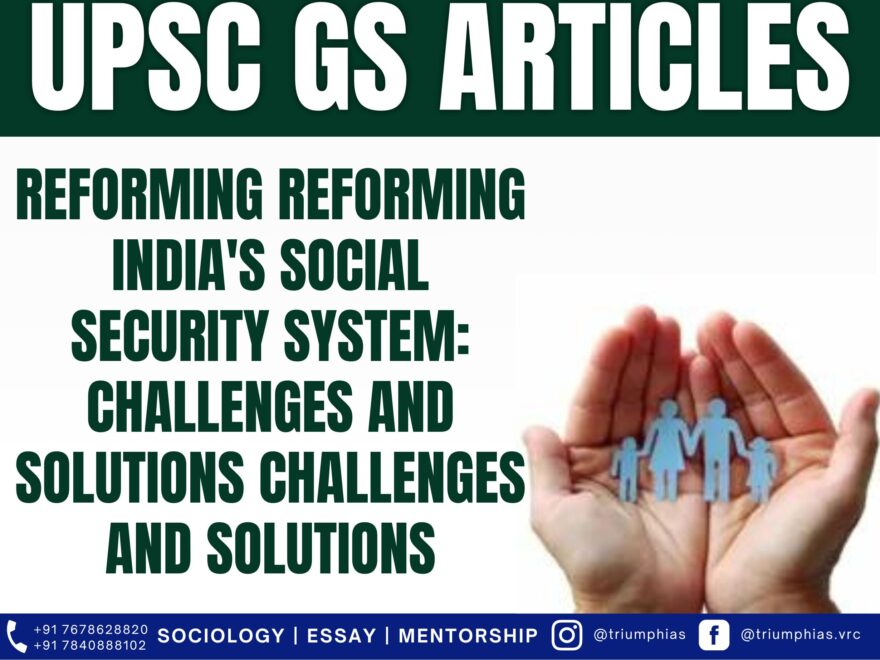India’s Social Security Net: A need of reform
(Relevant for General Studies Paper Prelims/Mains)

As per the information cited from the Periodic Labour Force Survey Annual Report 2021-22 and reported in the media, a significant proportion of India’s salaried workforce, approximately 53%, lacks any form of social security benefits. This implies that these employees do not have access to essential provisions such as provident funds, pensions, and health care and disability insurance.
Remarkably, merely 1.9% of the lowest 20% of India’s workforce enjoy the privilege of such benefits. Additionally, gig workers, comprising approximately 1.3% of the active labour force in India, seldom have access to any form of social security support. The overall performance of India’s social security system is also assessed poorly. In Mercer CFS’s 2021 ranking of 43 countries, India was positioned at a low 40th place.
Social security
As per the International Labour Organization (ILO), social security entails the safeguarding measures that a society extends to individuals and households in order to ensure their access to healthcare and to ensure a stable source of income. This security is especially crucial in situations like old age, unemployment, sickness, disability, work-related injuries, maternity, or the unfortunate loss of a breadwinner.
Social security policies encompass diverse categories of social insurances, including pensions, health insurance, disability benefits, maternity benefits, and gratuities.
Some Existing Social Security Policies in India
- The Code on Social Security, 2020: This comprehensive legislation consolidates and simplifies the content of nine prior laws associated with social security. It encompasses employees across both organized and unorganized sectors, outlining provisions for retirement pensions, provident funds, life and disability insurance, healthcare and unemployment benefits, sick leave, and paid parental leave.
- The Employees’ Provident Fund Organisation (EPFO): As a statutory entity, the EPFO oversees the administration of the Employees’ Provident Fund Scheme, Employees’ Pension Scheme, and Employees’ Deposit Linked Insurance Scheme. These schemes offer retirement pensions, provident funds, and life and disability insurance to employees engaged in the organized sector.
- The Employees’ State Insurance (ESI): This self-financed social security scheme furnishes medical care and cash benefits for employees in cases of sickness, maternity, disability, and unemployment. It extends coverage to organized sector employees earning below a specific threshold.
- The National Pension System (NPS): Operating as a voluntary, defined contribution pension program, the NPS permits individuals, including those in the unorganized sector, to save for their retirement. This initiative is accessible to all Indian citizens and provides diverse investment choices and tax advantages.
- The National Social Assistance Programme (NSAP): The NSAP constitutes a program for social security and welfare, aiming to assist elderly individuals, widows, disabled persons, and bereaved families who belong to below poverty line house
Issues and Challenges related to Social Security Policies and their Implementation
- Insufficient Budget Allocation: The establishment of the National Social Security Fund for unorganized sector workers commenced with an initial allocation of only ₹1,000 crore, which fell far short of the projected requirement exceeding ₹22,841 crore. This indicates that the government has not accorded priority to social security within its development agenda and has allocated insufficient resources to cater to the needs of society’s vulnerable segments.
- Ineffective Fund Utilization and Management: The funds earmarked for social security initiatives have not been employed with optimal efficiency. For instance, a CAG audit exposed that the National Social Security Fund, since its inception, had amassed ₹1,927 crore that remained unutilized. Similarly, the cess collected for supporting social security for construction workers in Delhi experienced inadequate utilization, with nearly 94% of the funds left unspent. Such instances underscore gaps in fund management and oversight, leading to wastage and underutilization of public funds.
- Corruption and Leakage: An additional challenge tied to social security policies and their execution pertains to corruption and fund leakage. In Haryana, the CAG identified an instance where the State’s Social Justice and Empowerment Department’s direct benefit scheme transferred ₹98.96 crore to the accounts of deceased beneficiaries. This suggests vulnerabilities in beneficiary identification, verification, and delivery mechanisms for social security benefits. Moreover, instances of fraud, bribery, nepotism, and political interference in fund allocation and distribution further compound this challenge.
- Inadequate Coverage and Benefits: A persistent concern involves the insufficient coverage and benefits offered by social security schemes in India. For instance, the Centre’s contribution to old-age pension schemes has remained stagnant at ₹200 per month since 2006, which is below the minimum daily wage. Moreover, some schemes have highly restrictive eligibility criteria that exclude deserving recipients. The National Social Assistance Programme, for instance, focuses on elderly impoverished individuals without wage-earning household members, granting them a monthly pension of ₹75. This leaves out numerous economically disadvantaged elderly individuals who may have some earning members in their households, yet still grapple with financial hardship and insecurity.
- Budgetary Reductions: The decline in budgetary allocations for the Mahatma Gandhi National Rural Employment Guarantee Act (MGNREGA) indicates a lack of prioritization for rural employment generation and social welfare.
- Technology and Digital Divide: Many social security programs are transitioning to digital platforms for registration and benefits distribution. However, a significant proportion of the populace, particularly in rural areas, lack access to technology and the internet, creating a digital divide that hinders their participation in these initiatives.
- Informal Labour Sector: Roughly 91% (approximately 475 million) of India’s workforce operates within the informal sector, where job security, benefits, and access to formal social security programs are frequently lacking.
What can be done?
- Comprehensive Social Security: It is now imperative for India to consolidate its existing social security schemes and ad hoc measures, aiming to extend universal social security coverage to the entire labor workforce. In the backdrop of increasingly on-demand jobs and the rise of hire-and-fire practices, job insecurity is mounting among India’s workers. In order to channel the benefits of economic growth more equitably while ensuring a sense of social security, policymakers should discard conventional supply-side economic theories and embrace policies that foster equitable growth.
- Expansion of EPFO Contributions: To enhance social security for formal workers, the expansion of contributions within the Employees’ Provident Fund Organisation (EPFO) system holds promise. This entails both employers and employees making contributions to the fund.
- Partial Contributions for Informal Workers: Informal workers with substantial earnings, whether self-employed or engaged in informal enterprises, could contribute partially. Encouraging informal enterprises to formalize and contribute could be integral to this strategy.
- Government Aid for Vulnerable Workers: To cater to those unable to contribute due to underemployment, unemployment, or low incomes, providing government subsidies or social assistance ensures universal access to basic social security support.
- Digitization and e-Shram Platform: Investments in digital platforms and data systems can streamline the registration, verification, delivery, monitoring, and evaluation of social security services, enhancing efficiency and transparency. The expansion and digitalization of the e-Shram platform have enabled the enrollment of millions of workers and extended insurance coverage. However, the onus of registration should not solely fall on informal workers, and involving employers could incentivize formalization.
- Mandatory Social Security for Employers: Enforcing mandatory social security entitlements for employees through their employers could foster formalization and enhance accountability in employee-employer relationships.
- Pan-India Labour Force Card: The introduction of a nationwide labor force card could simplify registration processes and extend social security coverage beyond the construction and gig worker sectors.
- Expansion of Successful Schemes: Effective schemes, such as the Building and Other Construction Workers Schemes, could be broadened to encompass a wider spectrum of workers. This might necessitate revisiting certain restrictions, such as cooling-off periods, to improve benefit portability.
- Addressing Specific Worker Groups: Special attention should be devoted to vulnerable worker groups like domestic workers and migrants. Expanding the coverage of social services such as childcare and organizing efforts for domestic workers could provide them with increased stability.
- Strengthening Existing Schemes: The government could also bolster existing schemes, such as the Employees’ Provident Fund (EPF), the Employees’ State Insurance Scheme (ESI), and the National Social Assistance Programme (NSAP), through budgetary support and extended coverage.
- Administrative Streamlining: Simplifying the administrative structure of social security programs is necessary. For instance, the current framework for unorganized workers has grown complex due to overlapping jurisdiction between the State and Centre, as well as the use of bewildering definitions, such as those for platform workers, unorganized workers, and the self-employed.
- Enhancing Awareness: There is a pressing need for heightened efforts to raise awareness about social security, ensuring that more workers are informed about available benefits. Organizations like the Self-Employed Women’s Association (SEWA), which operate Shakti Kendras (worker facilitation centers), could receive funding to launch campaigns, particularly targeting women, to provide comprehensive information about social security rights, along with government-offered services and schemes.
Enhancing policy execution, appropriate fund distribution, accountable resource utilization, and effective monitoring mechanisms are imperative. Failing to address these concerns could result in persistent hurdles and insufficient assistance for the target beneficiaries of social security initiatives. The government’s introduction of the Code on Social Security in 2020 is a constructive stride towards establishing a legal structure for social security encompassing diverse worker groups, encompassing those engaged in the gig economy and informal sectors.
To master these intricacies and fare well in the Sociology Optional Syllabus, aspiring sociologists might benefit from guidance by the Best Sociology Optional Teacher and participation in the Best Sociology Optional Coaching. These avenues provide comprehensive assistance, ensuring a solid understanding of sociology’s diverse methodologies and techniques.
Social Security, India, Labour Force, Reforms, Policy, Challenges, EPFO, ESI, NSAP, Unorganized Sector, Provident Funds, Pensions, Healthcare, Social Security in India, India, Social Security, Labour Force, Reforms, Policy, Challenges, EPFO, ESI, NSAP, Unorganized Sector, Provident Funds, Pensions, Healthcare, Social Security in India, Social Security, India, Social Security, India, Best Sociology Optional Coaching, Sociology Optional Syllabus.

Why Vikash Ranjan’s Classes for Sociology?
Proper guidance and assistance are required to learn the skill of interlinking current happenings with the conventional topics. VIKASH RANJAN SIR at TRIUMPH IAS guides students according to the Recent Trends of UPSC, making him the Best Sociology Teacher for Sociology Optional UPSC.
At Triumph IAS, the Best Sociology Optional Coaching platform, we not only provide the best study material and applied classes for Sociology for IAS but also conduct regular assignments and class tests to assess candidates’ writing skills and understanding of the subject.
Choose The Best Sociology Optional Teacher for IAS Preparation?
At the beginning of the journey for Civil Services Examination preparation, many students face a pivotal decision – selecting their optional subject. Questions such as “which optional subject is the best?” and “which optional subject is the most scoring?” frequently come to mind. Choosing the right optional subject, like choosing the best sociology optional teacher, is a subjective yet vital step that requires a thoughtful decision based on facts. A misstep in this crucial decision can indeed prove disastrous.
Ever since the exam pattern was revamped in 2013, the UPSC has eliminated the need for a second optional subject. Now, candidates have to choose only one optional subject for the UPSC Mains, which has two papers of 250 marks each. One of the compelling choices for many has been the sociology optional. However, it’s strongly advised to decide on your optional subject for mains well ahead of time to get sufficient time to complete the syllabus. After all, most students score similarly in General Studies Papers; it’s the score in the optional subject & essay that contributes significantly to the final selection.
“A sound strategy does not rely solely on the popular
Opinion of toppers or famous YouTubers cum teachers.”
It requires understanding one’s ability, interest, and the relevance of the subject, not just for the exam but also for life in general. Hence, when selecting the best sociology teacher, one must consider the usefulness of sociology optional coaching in General Studies, Essay, and Personality Test.
The choice of the optional subject should be based on objective criteria, such as the nature, scope, and size of the syllabus, uniformity and stability in the question pattern, relevance of the syllabic content in daily life in society, and the availability of study material and guidance. For example, choosing the best sociology optional coaching can ensure access to top-quality study materials and experienced teachers. Always remember, the approach of the UPSC optional subject differs from your academic studies of subjects. Therefore, before settling for sociology optional, you need to analyze the syllabus, previous years’ pattern, subject requirements (be it ideal, visionary, numerical, conceptual theoretical), and your comfort level with the subject.
This decision marks a critical point in your UPSC – CSE journey, potentially determining your success in a career in IAS/Civil Services. Therefore, it’s crucial to choose wisely, whether it’s the optional subject or the best sociology optional teacher. Always base your decision on accurate facts, and never let your emotional biases guide your choices. After all, the search for the best sociology optional coaching is about finding the perfect fit for your unique academic needs and aspirations.
To master these intricacies and fare well in the Sociology Optional Syllabus, aspiring sociologists might benefit from guidance by the Best Sociology Optional Teacher and participation in the Best Sociology Optional Coaching. These avenues provide comprehensive assistance, ensuring a solid understanding of sociology’s diverse methodologies and techniques. Sociology, Social theory, Best Sociology Optional Teacher, Best Sociology Optional Coaching, Sociology Optional Syllabus.
Best Sociology Optional Teacher, Sociology Syllabus, Sociology Optional, Sociology Optional Coaching, Best Sociology Optional Coaching, Best Sociology Teacher, Sociology Course, Sociology Teacher, Sociology Foundation, Sociology Foundation Course, Sociology Optional UPSC, Sociology for IAS,
Follow us :
🔎 https://www.instagram.com/triumphias
🔎https://www.youtube.com/c/TriumphIAS
https://t.me/VikashRanjanSociology
Find More Blogs
|
Scope of the subject and comparison with other social sciences |
|||
|
|
|
|
Modernity and social changes in Europe |


